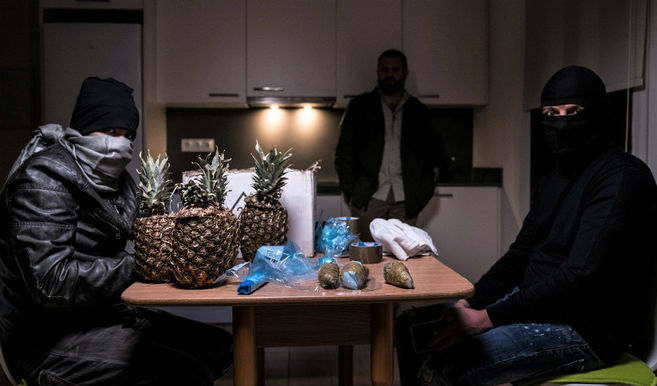When David Beriain asks a hitman how much it costs to kill a person, the hooded responds without flinching: 25,000 euros . The difference between this Clandestino program and its four previous seasons is that the offender interviewed by the journalist speaks in Madrid. Because mafias, drug trafficking, prostitution or human trafficking are not problems that occur only hundreds of kilometers away, but are also a reality, more or less visible, in our country.
This Monday, at 10.30 pm, DMax premieres Clandestino in Spain , the fifth season of this documentary series that, for the first time, investigates the criminal networks that operate within our borders. «The presence of the mafias, specifically the Camorra, is a subject nobody talks about, but Spain is one of the countries with the highest organized crime. They understand that it is a good place to be because, as long as they do not cross the bloodline, you can invest and the law is not hard with money laundering, ”Beriain explains.
«Mafias that are killed elsewhere, in Spain they live together. The state security forces recognize that if the money were taken from the mafias we would have a problem, ”says the journalist. And on screen, an Italian boss claims to own more than 100 buildings in Barcelona, including restaurants, hotels and nightclubs that anyone may have entered. " Keep talking about independence , we will continue doing business," says the criminal.
«To talk about cocaine trafficking, we have gone with a Spanish broker to Colombia and then we have seen how it moves here. Nobody sends a ton of cocaine if they do not know what will happen, which means there is corruption, ”Beriain points out on one of the issues addressed in the eight episodes of the program, which begins by showing the reality of immigrants trying to Entering Europe across the Strait of Gibraltar.
«According to UN figures, Spain is the country with the most prostitution in the world only behind Thailand and Puerto Rico. According to police data, 80% of these women do so under duress or exploitation. Why don't we get close to the stories behind those numbers? ”Asks David Beriain.
In Clandestino in Spain, the Navarrese journalist speaks with both those responsible for these organizations and with the people who are trapped in their networks, all those invisible victims . «The greatest luck we have is that we can live outside of most of these crime stories. They don't touch a normal person, but that doesn't mean they don't set up our country, ”says Beriain.
After touring the world investigating criminal organizations, the most difficult thing about this Clandestine in Spain has been the proximity of the danger. «When I go to Colombia, the exercise of packing up already makes you think, okay, I'm going to war. Here you work and then you will watch football . To the point that you get disoriented. Maintaining concentration has been the biggest challenge. We are more exposed, ”says Beriain on behalf of the 30 colleagues who work in this format produced by 93 meters .
«I have done some interviews literally meters from my house. And these people demand to know who you are, where you live. And if they let me talk to them, it's because I respond. It is the language they understand, that of personal guarantee, ”he concludes.
According to the criteria of The Trust Project
Know moreSavings and ConsumptionOffensive against the fraud of fake bio products
Directors The bank pays the best salaries in Spain, with salaries of up to 300,000 euros
MotorIndustry: "For safety we cannot have cars older than 12 years. To renew them we must also have diesel"

